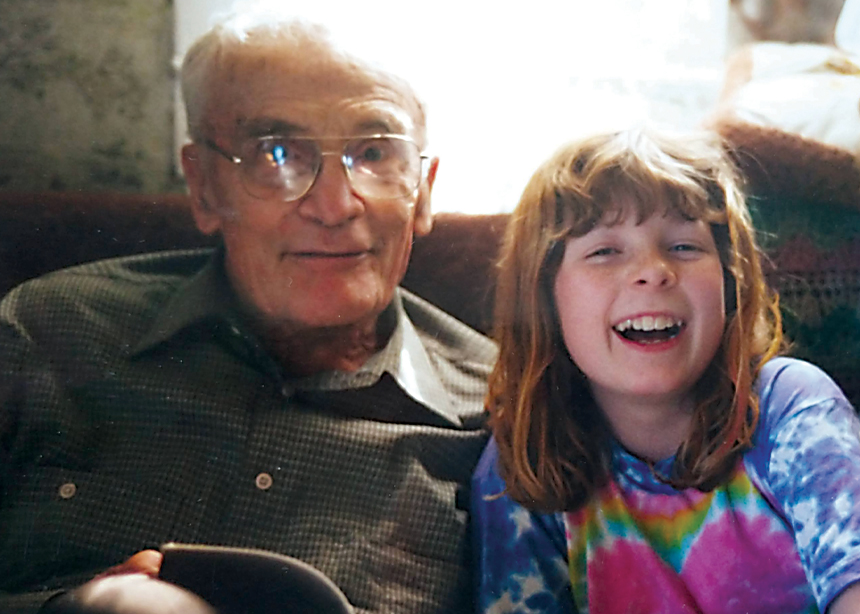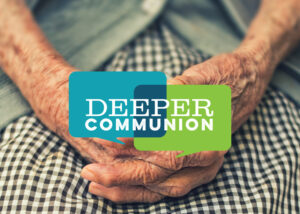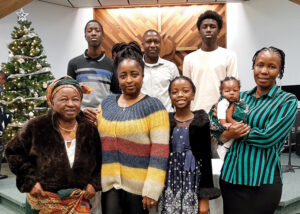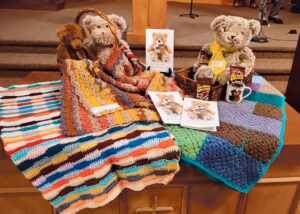Grandpa’s shoelaces were round, not flat like my own. They were a challenge to tie up, even for my nimble fingers. He sat in his straight-backed chair at the kitchen table, and, since his fine motor skills had declined, it became my job to tie up those laces before school each morning.
Sometimes he would ask me to do up the buttons on the cuffs of his shirtsleeves too, the tiny, hard-to-reach ones.
If he was embarrassed to ask for my help, I didn’t notice. Perhaps asking his grade-school grandchild was easier than asking his grown son or daughter-in-law. They were busy with the farm.
I grew up living in the same house as my grandma and grandpa. Our 175-year-old farmhouse was split into two apartments when my parents took over the farm, before I was born. Our home was on the upper floor and attic, with my grandparents on the main floor.
I knew independence from a young age; my parents would be in the fields or barn while I was in the yard or house, knowing Grandma was not far, even if she wasn’t actively watching me. Their part of the house was always open to me and my brother.
My grandparents weren’t young, so Grandpa was nearly 80 when I was born. He had a stroke when I was almost five and many mini-strokes while he remained on the farm. I’m sure that was stressful for my parents, but from my perspective, it was an opportunity to see aging in a safe atmosphere, in a normalized way.
A few times, I found Grandpa fallen over from one of his mini-strokes. I knew to find my parents, and they would take care of him. I don’t recall feeling fear or being particularly upset. Grandpa was old; his body did not work like mine. I understood that.

If my grandparents were asleep when I popped through their door before school, I would set their table for breakfast. Dishes and cutlery went on the laminate table. I’d leave the honey on the radiator to soften. I would climb on the counter to reach the cupboard where the cereal was stored. Sometimes Grandma would walk in on me climbing. She’d chuckle and call me her little bug.
Grandma was a schoolteacher to her core. I credit her with teaching me to read and write. I’m sure my parents, older brother and school did much of the work, but Grandma’s teachings are my most prominent memories. She didn’t just teach me the function of literacy—she taught me the love of it.
Though I don’t remember all his words, I can still hear Grandpa’s voice and cadence when he would pray for dinner. Faith was quietly ingrained in daily activities. Grandma waited to see crocuses in spring and praised God quietly when they arrived. That faith pointed me to the consistent persistence of God and his promises. When the lawn mower quit far from home, and Grandpa had no walker to get back, he prayed until help came. He taught me trust in God when things looked impossible.
Grandpa stayed on the farm almost until the end. He spent a year in nursing care before he passed away at the age of 93. Grandma had Alzheimer’s in her final years. I went to visit her a few weeks before she died. Though she spoke very little at that point, and hadn’t recognized anyone for months, when I walked in she said my name.
Living with my grandparents made aging part of my reality from my earliest days. Aging was not a clinical thing with sanitized floors and locked doors; it was not a scary thing like hospitals and nursing homes full of strangers. That normalization helped me let my grandparents go when they died. I watched them live out their days, knowing I had been an active part of that living. I grieved them both deeply. I still do some days. They were my first real loss, but there was always peace and resolution within that grief.








Leave a Reply
You must be logged in to post a comment.